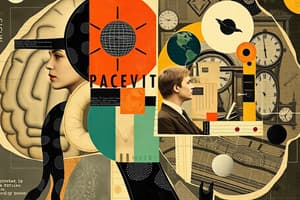Podcast
Questions and Answers
What are the main types of learning?
What are the main types of learning?
Skill learning, verbal learning, and concept learning.
What is transfer of training?
What is transfer of training?
Transfer of training refers to the process of using earlier learning in a new situation.
What is learning? Give an example.
What is learning? Give an example.
Learning may be defined as a relatively durable change in behavior due to experience. An example is learning to ride a bicycle.
Describe the process of classical conditioning.
Describe the process of classical conditioning.
What are the main types of reinforcement? What is the role of reinforcement in operant conditioning?
What are the main types of reinforcement? What is the role of reinforcement in operant conditioning?
Give examples of observational learning and skill learning.
Give examples of observational learning and skill learning.
Learning transforms a person in many ways and occurs throughout one’s life.
Learning transforms a person in many ways and occurs throughout one’s life.
Which of the following is NOT a type of learning mentioned in the content?
Which of the following is NOT a type of learning mentioned in the content?
What happens during overlearning?
What happens during overlearning?
What is learning?
What is learning?
Which type of conditioning was discovered by Ivan P. Pavlov?
Which type of conditioning was discovered by Ivan P. Pavlov?
Who advocated the role of operant conditioning?
Who advocated the role of operant conditioning?
Learning is a ______ permanent change in ______.
Learning is a ______ permanent change in ______.
What type of reinforcement increases the rate of response?
What type of reinforcement increases the rate of response?
Positive reinforcement reduces the rate of response.
Positive reinforcement reduces the rate of response.
Observational learning depends on the existence of appropriate models.
Observational learning depends on the existence of appropriate models.
Partial reinforcement does not help in maintaining behavior.
Partial reinforcement does not help in maintaining behavior.
What is verbal learning?
What is verbal learning?
Operant conditioning is also called ______ learning.
Operant conditioning is also called ______ learning.
Match the following types of learning with their definitions:
Match the following types of learning with their definitions:
Flashcards are hidden until you start studying
Study Notes
Learning
- Learning is a continuous process through which individuals develop from simple reflexes to complex behaviors.
- It is vital for personal growth and involves transforming potential into actual abilities, allowing individuals to achieve their dreams.
- Defined as a relatively durable change in behavior due to experience; temporary changes (e.g., due to maturation or illness) do not qualify as learning.
- Observable changes in behavior (e.g., reduced errors with practice) indicate learning.
Types of Learning
-
Classical Conditioning:
- Discovered by Ivan Pavlov through experiments with dogs to study stimulus-response relationships.
- Involves pairing a neutral stimulus (Conditioned Stimulus - CS) with a biologically significant stimulus (Unconditioned Stimulus - UCS) to elicit a conditioned response (Conditioned Response - CR).
- CS (e.g., buzzer) becomes associated with UCS (e.g., food), leading to salivation in dogs when only the CS is presented.
- Key processes: Acquisition (learning phase), Extinction (disappearance of CR when CS is repeatedly presented without UCS), and Spontaneous Recovery (temporary return of CR after extinction).
-
Operant Conditioning:
- Focuses on learning through consequences: behaviors followed by rewards are reinforced, while those followed by punishment are discouraged.
- Developed by B.F. Skinner, who utilized the Skinner Box to illustrate this learning process in rats.
- Positive reinforcement increases the rate of response by providing a rewarding stimulus, while negative reinforcement increases response through the removal of an aversive stimulus.
- Types of reinforcement: Continuous (every correct response reinforced) and Partial (some responses reinforced; more effective for maintaining behaviors).
-
Observational Learning:
- Learning by observing the behaviors of others; often referred to as modeling.
- Important for acquiring social roles and behaviors, particularly in children.
- Complex process influenced by the presence of appropriate role models; can lead to both positive and negative behavior acquisition.
Additional Learning Types
-
Verbal Learning:
- Involves learning language through structured methods like serial learning and paired associates.
- Progression from recognizing alphabets to constructing sentences.
-
Concept Learning:
- Developing meaningful categories (e.g., objects or events) aiding in communication and understanding.
- Involves abstract and concrete concepts; helps in organizing complex information and experiences.
-
Skill Learning:
- Acquisition of practical abilities (e.g., driving, writing) allows individuals to perform tasks automatically and efficiently.
- Skills can become automatic through over-learning, enabling multitasking (e.g., talking while driving).
Transfer of Training
- Learning from one task can be applied to similar situations; valuable for utilizing knowledge and skills effectively across different contexts.### Transfer of Training
- Involves applying previous knowledge in new situations, impacting learning outcomes.
- Positive transfer: prior learning aids new learning.
- Negative transfer: prior learning hinders new learning.
- Zero transfer: prior learning neither helps nor interferes.
Learning and Its Impact
- Learning is a lifelong process that alters personality, attitudes, and interests.
- Proficient learners take advantage of every opportunity to learn.
- As learning progresses, capability to learn also improves, leading to better adaptability and appreciation of reality.
Effective Study Habits
- Specific Study Area: Choose a quiet, well-lit space dedicated solely to studying to enhance focus.
- Spaced Sessions: Employ shorter, frequent study sessions instead of one long study period for effective learning retention.
- Memory Aids: Utilize techniques that associate new information with easily memorable ideas or visuals.
- Self-Testing: Regularly practice with flashcards or quizzes to reinforce knowledge and prepare for evaluations.
- Overlearning: Continue studying beyond initial mastery to ensure thorough understanding before assessments.
- Avoid Procrastination: Combat the tendency to delay tasks by utilizing a structured schedule and setting specific goals.
Types of Learning
- Classical Conditioning: Involves pairing a neutral stimulus with a natural stimulus, creating associations.
- Operant Conditioning: Focuses on behaviors that are reinforced by positive outcomes or avoidance of negative ones.
- Verbal Learning: The process of learning language and acquiring skills through instruction and practice.
- Skill Learning: Involves acquiring practical abilities, such as riding a bicycle or driving.
- Observational Learning: Learning by watching the behaviors of others and their consequences.
Reinforcement in Learning
- Reinforcement is defined as any action that increases the rate of a response in operant conditioning.
- Types of reinforcement include positive reinforcement (increasing behavior through rewards) and negative reinforcement (encouraging behavior by removing negative stimuli).
- Continuous reinforcement rewards every correct behavior, aiding in behavior establishment.
Importance of Transfer of Training
- Facilitates application of learned skills and knowledge across various contexts, enhancing real-life problem-solving abilities.
- Recognizes the significance of adapting learning strategies to suit new environments or challenges encountered.
Studying That Suits You
Use AI to generate personalized quizzes and flashcards to suit your learning preferences.




